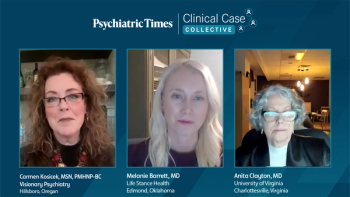Postpartum Depression Management: Exploring Treatment Options for Mothers in Need of Support

Melanie Barrett, MD; Anita Clayton, MD, and Carmen Kosicek, MSN, PMHNP-BC, discuss how postpartum depression affects up to 1 in 7 new mothers, presenting with symptoms like persistent sadness, anxiety, and difficulty bonding with the baby, yet remains underdiagnosed and undertreated despite being highly treatable through therapy, medication, and support systems.

Melanie Barrett, MD; Anita Clayton, MD, and Carmen Kosicek, MSN, PMHNP-BC, discuss how real patients navigate the complex journey of seeking and receiving postpartum depression care, from overcoming stigma and recognizing symptoms to finding appropriate healthcare providers and accessing treatment while managing new motherhood responsibilities.

Melanie Barrett, MD; Anita Clayton, MD, and Carmen Kosicek, MSN, PMHNP-BC, discuss how breaking the stigma around postpartum depression requires both healthcare providers and society to normalize open conversations about maternal mental health, while encouraging mothers to seek support without shame or judgment.

Melanie Barrett, MD; Anita Clayton, MD, and Carmen Kosicek, MSN, PMHNP-BC, discuss how effective screening tools like the Edinburgh Postnatal Depression Scale (EPDS) and PHQ-9, combined with comprehensive clinical assessments, are crucial for accurately identifying postpartum depression during routine prenatal and postnatal visits.

Melanie Barrett, MD; Anita Clayton, MD, and Carmen Kosicek, MSN, PMHNP-BC, discuss how postpartum depression treatments are evolving beyond traditional antidepressants to include rapid-acting options like brexanolone and zuranolone, along with enhanced screening and support programs for new mothers.

Melanie Barrett, MD; Anita Clayton, MD, and Carmen Kosicek, MSN, PMHNP-BC, discuss how a mother's PPD symptoms emerged gradually through increasing anxiety, intrusive thoughts, and emotional detachment, ultimately leading her to seek professional help after her partner noticed concerning behavioral changes at 12 weeks postpartum.

Melanie Barrett, MD; Anita Clayton, MD, and Carmen Kosicek, MSN, PMHNP-BC, discuss how prompt intervention combining psychotherapy, social support mobilization, and potential medication options provides comprehensive care for the mother experiencing PPD symptoms at 12 weeks, with emphasis on both immediate symptom relief and long-term recovery strategies.

Melanie Barrett, MD; Anita Clayton, MD, and Carmen Kosicek, MSN, PMHNP-BC, discuss how a mother's persistent PPD symptoms despite SSRI treatment necessitated a comprehensive reevaluation of medication dosage, additional therapeutic interventions, and closer monitoring of treatment response to achieve better symptom control.

Melanie Barrett, MD; Anita Clayton, MD, and Carmen Kosicek, MSN, PMHNP-BC, discuss how optimizing SSRI dosage, potentially augmenting with another medication class, and intensifying psychosocial support helps address breakthrough PPD symptoms in mothers with partial response to current SSRI treatment.

About 40% of women who have postpartum depression go unrecognized and untreated, and they are still symptomatic 3 years later.


